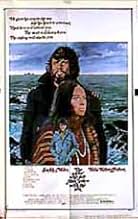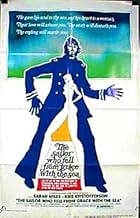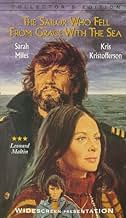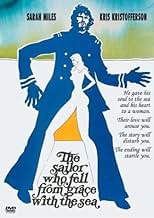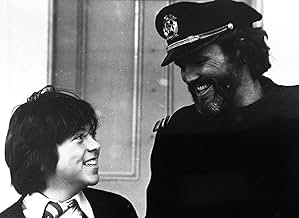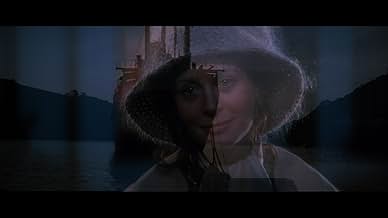Le marin qui abandonna la mer
Titre original : The Sailor Who Fell from Grace with the Sea
ÉVALUATION IMDb
6,2/10
1,8 k
MA NOTE
Ajouter une intrigue dans votre langueAfter his father dies, a disturbed young boy plots to take revenge on the new man in his mother's life.After his father dies, a disturbed young boy plots to take revenge on the new man in his mother's life.After his father dies, a disturbed young boy plots to take revenge on the new man in his mother's life.
- Director
- Writers
- Stars
- Prix
- 2 nominations au total
Charles Adey-Grey
- Man in Tea Room
- (uncredited)
Mabel Etherington
- Woman in Tea Room
- (uncredited)
Juba Kennerley
- Man in Tea Room
- (uncredited)
Avis en vedette
The movie is indeed an adaptation of a novel by Yukio Mishima. Just to clarify, the novel is not an obscure work. Mishima is amongst Japan's most famous writers and was nominated for the Nobel Prize for Literature three times. Also, the plot of the original Japanese story does not happen in a remote fishing village; it happens in Yokohama, which is one of Japan's largest cities. Lastly, it does not happen in feudal Japan, a fact that would be very evident had someone read the book.
Now that that's been said, I've watched the movie since I very much enjoyed the novel. While I agree with most comments concerning the movie itself, I actually very much enjoyed the ending. Not only would have supplying an ending would have been taking too much liberty, but also it allows the viewer to imagine what would happen. Furthermore, to challenge another commenter, this sort of ending does work in movies and was a common motif of films during this era. Some other notable movies with endings similar to this include Francis Ford Coppola's "The Conversation" and "Parallax View."
Now that that's been said, I've watched the movie since I very much enjoyed the novel. While I agree with most comments concerning the movie itself, I actually very much enjoyed the ending. Not only would have supplying an ending would have been taking too much liberty, but also it allows the viewer to imagine what would happen. Furthermore, to challenge another commenter, this sort of ending does work in movies and was a common motif of films during this era. Some other notable movies with endings similar to this include Francis Ford Coppola's "The Conversation" and "Parallax View."
An unforgettable and profoundly disturbing story centered on a widow, Anne, and her only son, Jonathan, in a remote English seaside town. Jonathan belongs to a gang led by a precociously intelligent sociopath known only as Chief, who through sheer force of will and intellect, indoctrinates them with a quasi-Neitzchean philosophy of ultimate superiority and the non-existence of morality. When Kris Kristofferson's Captain Jim arrives in town, and strikes up a passionate relationship with the lonely Anne, Jonathan sees him as a heroic masculine prototype, removed from society and living a 'true' life on the open sea. But when the Captain decides to settle down and marry Anne, Jonathan takes it as an ultimate and unforgivable betrayal, and exacts a terrible revenge.
Based on the 1963 Mishima novel, "The Sailor Who Fell From Grace With The Sea" hints at many themes, from Jonathan's Oedipal obsession with spying on his mother's bedroom to his physical admiration of the Captain that verges on latent homosexuality. The atmosphere, masterfully created by veteran cinematographer Douglas Slocombe, is one of darkly brooding clouds, gray seas, and an air that constantly threatens rain. The (in)famous sex scenes are really not that explicit, and the casual violence exhibited by the children is far more shocking than any glimpse of breast or buttock.
The film, for all its brilliantly evocative atmosphere, excellent performances, and quietly brooding menace, is not without its flaws. The score is terrible, all mawkish piano and sickly clarinet. It is often overly intrusive and distracts from the overall sense of ripe stillness that director Carlino conjures throughout the film. But in general, the film is a remarkable experience, and one that any viewer is unlikely to forget quickly.
Based on the 1963 Mishima novel, "The Sailor Who Fell From Grace With The Sea" hints at many themes, from Jonathan's Oedipal obsession with spying on his mother's bedroom to his physical admiration of the Captain that verges on latent homosexuality. The atmosphere, masterfully created by veteran cinematographer Douglas Slocombe, is one of darkly brooding clouds, gray seas, and an air that constantly threatens rain. The (in)famous sex scenes are really not that explicit, and the casual violence exhibited by the children is far more shocking than any glimpse of breast or buttock.
The film, for all its brilliantly evocative atmosphere, excellent performances, and quietly brooding menace, is not without its flaws. The score is terrible, all mawkish piano and sickly clarinet. It is often overly intrusive and distracts from the overall sense of ripe stillness that director Carlino conjures throughout the film. But in general, the film is a remarkable experience, and one that any viewer is unlikely to forget quickly.
Though I never read the Japanese book from which this movie is based - I thought the comments of other posters missed a salient point in their reviews.
No one brought up the exploration of the focus on the "pure and perfect" order of things that is a backdrop for the exploration of the boys in the film. I'm assuming that that refers to the idea that there is such a thing and that when we deviate from it - meaning is somehow bastardized - and focus and purpose are lost. Unfortunately, when - during exploration - one destroys the object of one's investigation that too seems a bastardization of the "pure and perfect order."
A disturbing film but I do like Kris Kristofferson and he did write the music for the soundtrack which is beautiful. I tried many times to find a CD of the soundtrack but the movie has been out of print for so long that it is probably not possible to find one.
No one brought up the exploration of the focus on the "pure and perfect" order of things that is a backdrop for the exploration of the boys in the film. I'm assuming that that refers to the idea that there is such a thing and that when we deviate from it - meaning is somehow bastardized - and focus and purpose are lost. Unfortunately, when - during exploration - one destroys the object of one's investigation that too seems a bastardization of the "pure and perfect order."
A disturbing film but I do like Kris Kristofferson and he did write the music for the soundtrack which is beautiful. I tried many times to find a CD of the soundtrack but the movie has been out of print for so long that it is probably not possible to find one.
This is a very chilling movie based on an even more chilling novel. It does seem to be a cross between "Oedipus Rex" and "Lord of the Flies" as some reviewers have astutely pointed out, but it is actually based on an obscure Japanese novella. The original story had a Japanes protagonist and was set in a Japanese fishing village. The filmmakers don't entirely succeed in transplanting the action to rural England and casting a Kris Kristoferson in the lead role, but an international film never could have gotten made at the time with a Japanese lead, and once they cast Kristoferson, setting the movie in a Japanese fishing village would have drawn the inevitable charges of racism from the perpetually outraged idiots in the "PC" crowd.
Besides the awkwardness of the adaptation is redeemed by some great acting. This is probably Kristoferson's second best role after "Pat Garret and Billy the Kid". Sarah Miles is also very good as the lonely widow. Her sex scenes with Kristoferson are very erotic if very perverse (you see them only through a peephole as her disturbed son watches). The British child actors are also very good for a change, particularly the very disturbed but nevertheless sympathetic son and the truly psychopathic leader of the gang of schoolboys he runs with (who make the "Children of the Damned" look cute and cuddly by comparison). The scene where the gang eviscerates a live cat is almost unbearable to watch. And the final scene on a hill overlooking the sea is chilling, tragic, fatalistic, beautiful, and mythic all at once. This is and haunting and unforgettable movie.
Besides the awkwardness of the adaptation is redeemed by some great acting. This is probably Kristoferson's second best role after "Pat Garret and Billy the Kid". Sarah Miles is also very good as the lonely widow. Her sex scenes with Kristoferson are very erotic if very perverse (you see them only through a peephole as her disturbed son watches). The British child actors are also very good for a change, particularly the very disturbed but nevertheless sympathetic son and the truly psychopathic leader of the gang of schoolboys he runs with (who make the "Children of the Damned" look cute and cuddly by comparison). The scene where the gang eviscerates a live cat is almost unbearable to watch. And the final scene on a hill overlooking the sea is chilling, tragic, fatalistic, beautiful, and mythic all at once. This is and haunting and unforgettable movie.
The script and direction meld into a strong movie. With charm and humor to spare, this film was among the top echelon of movies from 1976. The characters in this film have a lot of depth, and that makes all the difference. In the end, the audience gets a casserole of film elements and little of the satisfaction that comes from watching these types of movies. I guess if I was in a bad mood, this movie wouldn't be half as good, but I thought it to be enjoyable and would recommend it. This is a story about a place most people might not be able to conceive. It is a powerful film. Many scenes do not feel believable, but good performances help to enhance this story.
Le saviez-vous
- AnecdotesFirst English language filmed adaptation of a novel by Japanese writer Yukio Mishima.
- Autres versionsUS DVD version is cut. Sex scenes of Sarah Miles are tamed down in US version.
- ConnexionsReferenced in Fantasm Comes Again (1977)
Meilleurs choix
Connectez-vous pour évaluer et surveiller les recommandations personnalisées
- How long is The Sailor Who Fell from Grace with the Sea?Propulsé par Alexa
Détails
- Date de sortie
- Pays d’origine
- Langue
- Aussi connu sous le nom de
- The Sailor Who Fell from Grace with the Sea
- Lieux de tournage
- sociétés de production
- Consultez plus de crédits d'entreprise sur IMDbPro
Contribuer à cette page
Suggérer une modification ou ajouter du contenu manquant

Lacune principale
By what name was Le marin qui abandonna la mer (1976) officially released in India in English?
Répondre
